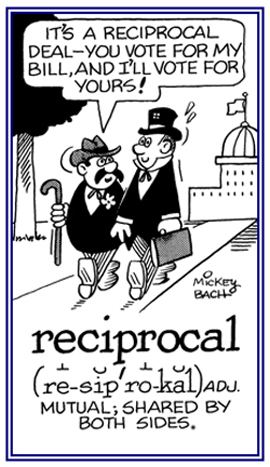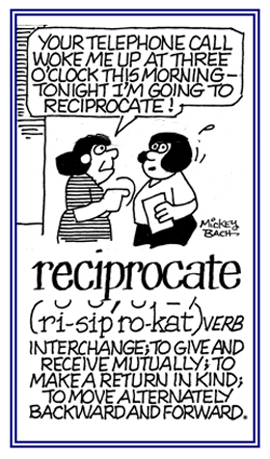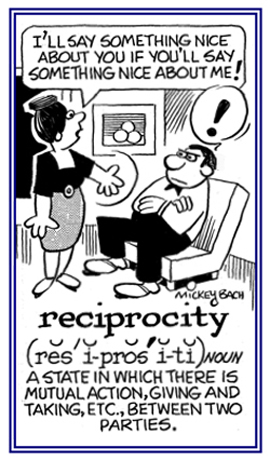pro-, por-, pur-
(Greek > Latin: a prefix signifying before; forward, forth; for, in favor of; in front of; in place of, on behalf of; according to; as, to place before; to go before or forward, to throw forward)
2. The function or power of someone who is authorized to act as the deputy or substitute for another person.
3. Etymology: from about 1440, prokecye, "agency of one who acts instead of another"; contraction of Anglo-French procuracie, from Middle Latin procuratia, "administration"; from Latin procuratio, "care, management" from procurare, "to manage".
2. Etymology: from purloinen, "remove, make distant, misappropriated"; borrowed through Anglo-French purloigner, purloiner, "remove" and directly from Old French porloigner, "put off"; from pur-, "forth"; from Latin pro-, "for, forth" + Old French loing, loin, "far"; from Latin longe which is from longus, "long".



Go to this Word A Day Revisited Index
so you can see more Mickey Bach illustrations.
"Adam had a purloined book from the library in his book case."
A purloiner was caught trying to steal a lamp shade which she used as a hat and pretended not to know what lamp shade the police officer was talking about.
2. Descriptive of something given, performed, felt, etc., in return; concerning something given or shown by each of two sides or people to the other: After the German exchange group visited Tamworth, the English students planned on a reciprocal visit the following year.
3. Conveying a corresponding; matching; complementary; equivalent: The members of the fitness studio were able to have reciprocal privileges at other health clubs.
4. In grammar, with reference to a pronoun or verb; expressing mutual relationship or action: "Each other” and “one another” are reciprocal pronouns.
5. Pertaining to something which is inversely related or proportional; opposite: The contrasting, or reciprocal, color of fabric used for the lining was bright red as opposed to the bright blue color of the dress.
6. Etymology: from Latin reciprocus, "turning back the same way, alternating", which stands for reco-procos and is a compound of the adjectives recos, "turning backward", and procos, "turning forward"; therefore, reciprocus originally meant "turning backward and forward".
Reciprocal, when all things are considered, is a compound adjective based on the elements re-, "back, backward" and pro-, "for, forward".

Go to this Word A Day Revisited Index
so you can see more of Mickey Bach's cartoons.
Anyone who reciprocates is returning the same kind of treatment that another person has done to him or to her, whether it is good or bad.
2. To interchange; each person or group giving or doing to the other the same thing; to give, to feel, etc., in return: Alice loved her daughter Lucy very much, and this love was certainly reciprocated by Lucy towards her mother as well.3. Etymology: from Latin reciprocare "to move back" and "forth"; from re-, "backward" + pro, "forward" + -cate, "normally a verb ending".


Go to this Word A Day Revisited Index
so you can see more of Mickey Bach's cartoons.
2. A returning, usually for something given: Mary wanted to invite her neighbor over for lunch as a reciprocation for taking her to the doctor's offie the week before.
3. A mutual giving and receiving: The two sisters thought that the reciprocation of giving each other Christmas presents every year was a great thing.
4. In prosthodontics, the means by which one part of an appliance is made to counter the effect created by another part: Prosthodontics refers to a dental specialty concerned with the restoration and maintenance of oral function by the reciprocation or replacement of missing teeth and structures by artificial devices or prostheses.
2. A cooperative interchange of favors or privileges, especially the exchange of rights or privileges of trade between nations: The two countries did business and had transactions with goods and services with each other and this common reciprocity equally benefited them and existed for many years.
3. An arrangement in personal licensure whereby one jurisdiction accepts another jurisdiction's prior issuance: Both countries agreed on a reciprocity, allowing an individual to practice medicine and not being required to demonstrate again through examination or otherwise, that he or she has met minimum levels of competence required for a license.
4. An arrangement between governments whereby their nationals are entitled to certain stated medical care or other benefits on an agreed basis: Within the European Community there exists a reciprocity whereby the citizens are allowed to cross the boarders between the different countries without having to prove their identity with using their passports, which is a great advantage for everybody!
5. In anthropology, a system in which the exchange of goods is conducted within the groups of a society or community according to a prescribed ritual: Reciprocity is a non-market trading between people in countries or even in the home when gifts are given to each other for Christmas or as birthday presents.

Go to this Word A Day Revisited Index
so you can see more of Mickey Bach's cartoons.
Reciprocity in the news: "Talking tough on trade, Paris seeks 'reciprocity' "
The French agriculture minister Thursday (May 31, 2007) warned that France could use its veto powers to block a global trade deal that did not protect European agricultural interests.
The French minister, Christine Lagarde, said, "The need for reciprocity is imperative. We will not see a breakthrough in global trade talks until we see exact figures from the United States that show reciprocity and balance."
2. To bring about again; to effect, exhibit, or present anew; to repeat in some fashion.
3. To repeat in a more or less exact copy; to produce a copy of (a work of art, picture, drawing, etc.), now especially, by means of engraving, photography, or similar processes.
4. To create again by a mental effort; to represent clearly to the mind.
2. That which can produce again; for example, to produce (new individuals of the same kind) by a sexual or asexual process.
3. Something that can be cause something to exist again or to renew (reproduce water from steam).
4. That which can imitate closely (sound-effects can reproduce the sound of thunder).
5. Anyone, or anything, that makes a representation of (as an image or copy) or reproduces a face on canvas.


